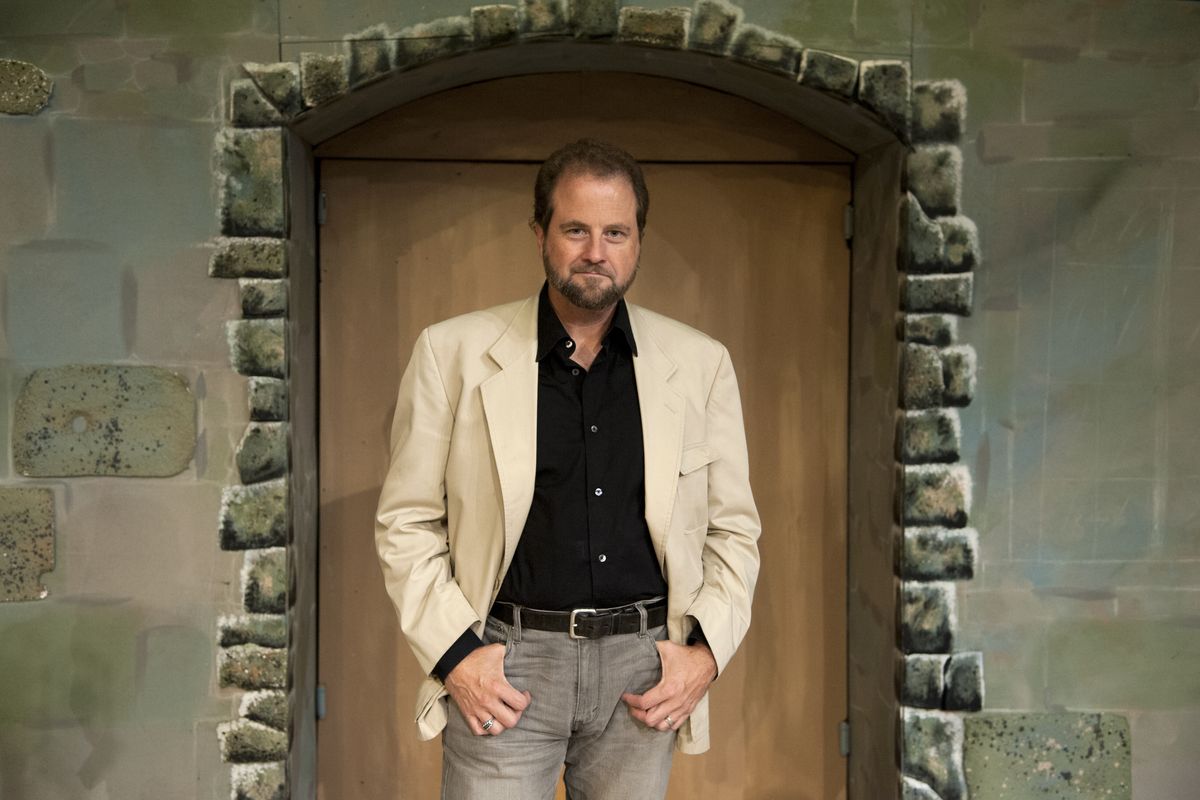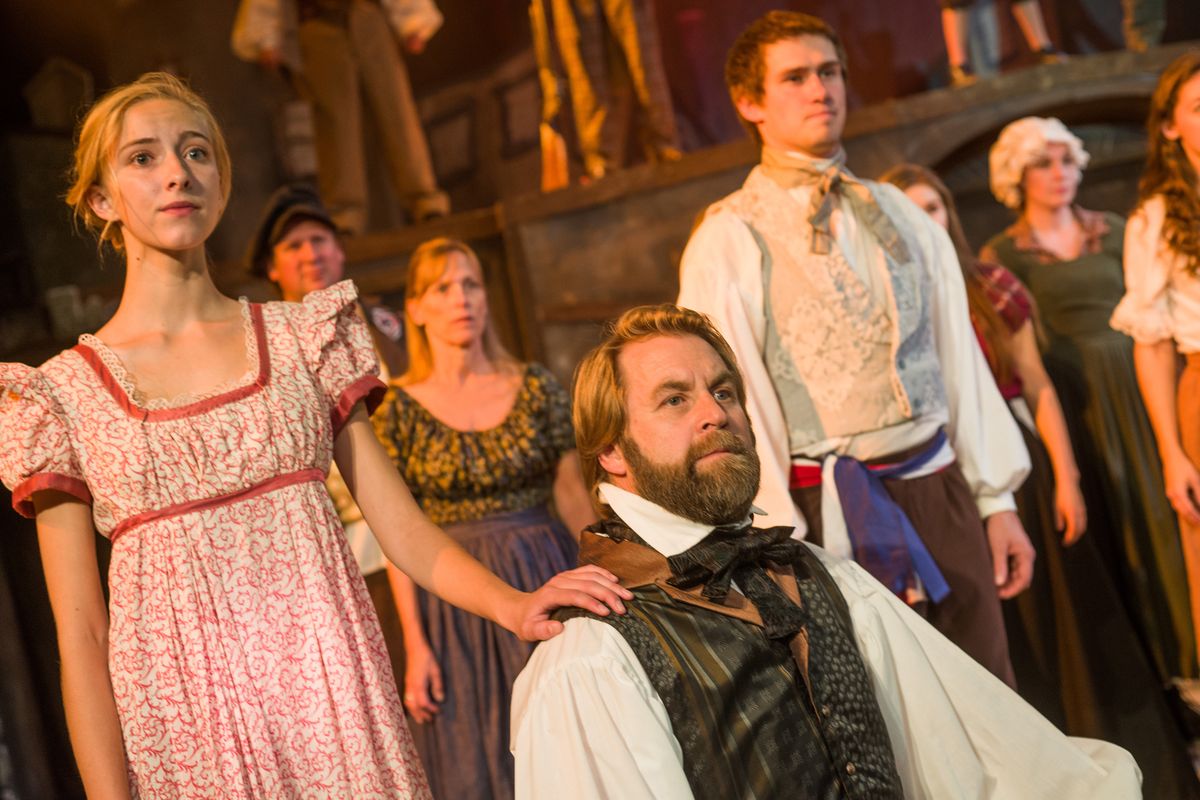Douglas Webster set to lead Civic Theatre’s ‘Les Miserables’
Natalya Ferch, as Cosette, and Jim Swoboda, as Jean Valjean, in Civic’s “Les Mis.”
“This isn’t my first rodeo,” Webster said. “The nice thing is, I can tell the actors, ‘We’re right where we need to be.’ ”
Webster has stormed the barricades in “Les Miserables” hundreds of times, on stages all over the country. He was in the national tour for two years beginning in 1989, playing numerous roles and understudying for the lead role of Jean Valjean.
Then, after a break to perform opera and classical music, he did a one-year stint on Broadway. He played 16 different roles, and was again an understudy for the role of Jean Valjean. He played Valjean six times on Broadway and went on to play that role many times in regional theaters all over the country, including in Portland, Phoenix, Little Rock and, in 2008, at the Coeur d’Alene Summer Theatre.
So Webster doesn’t merely “know” this show.
“I’ve been breathing it for 25 years,” he said.
As opening night looms at the Spokane Civic Theatre, Webster calls himself “the luckiest director on the planet,” because of what he found when he was called in from Portland to take over the show in mid-July. The original director, Civic’s executive artistic director Yvonne A.K. Johnson, had already cast the show and begun working on it when she was fired after a shift in the theater’s board.
Suddenly, the most complex show ever attempted by the theater had no director. Webster, a known quantity in this region from his commanding appearance at the Coeur d’Alene Summer Theatre, was hired to take over a few days later. He wasn’t entirely certain what he would find.
“Coming in to a community theater, I didn’t know what their expectations of themselves were,” said Webster.
It didn’t take him long to find out.
“Any question I had as to the ability of people to tell the story, those questions went away within the first 10 minutes of the first rehearsal,” Webster said. “These people were all committed, with vocal strength and good humor. … It’s phenomenal. The talent base in Spokane is deep.”
“Les Mis” has a cast of 42, a large pit orchestra, and a daunting number of set pieces, props, costumes, light cues and sound cues. So Webster was especially pleased to discover that the Civic’s design and construction staff, headed by technical director David Baker, was of top professional quality. Webster calls Baker “an artist … a fine artist.”
“He has fleshed out a world,” Webster said. “(The Civic’s professional staff) is equal to any I’ve met in regional theaters around the country.”
Close to 100,000 people have seen the touring version of “Les Mis” in its five visits to Spokane over the last two decades. Yet this will be a much more intimate experience for audiences because the Civic’s Main Stage seats only 336 people, compared to 2,600 in the INB Performing Arts Center. Baker and his crew will provide most of the well-known visual elements that have made “Les Mis” such a spectacle: the revolving stage, the barricades and the steaming Parisian sewers.
The quality of the cast is the other reason that Webster considers himself a lucky director. He is particularly high on his Jean Valjean, Jim Swoboda, who is, in a sense, making his musical theater debut. The last time Swoboda was in a full-fledged musical theater production was 32 years ago when he played the undertaker in “A Christmas Carol” at the Civic. Swoboda said he had no lines and “just walked around and scared kids in the audience.”
And now Swoboda is playing one of the most challenging roles in all of musical theater.
“For me, this is a total, for lack of a better term, midlife crisis,” Swoboda said.
However, don’t be misled. Swoboda has decades of experience in music and in show business. He has sung with the Spokane Symphony Chorale for 27 years, including significant solo work. He has sung with the Spokane Opera. He sang last fall in the Civic’s concert version of Jason Robert Brown’s “Songs for a New World,” a gig which helped him land this role. He also owns ILF Media Productions, a film and video company, for which he is a director and director of photography. Previously, he worked for North by Northwest Productions and shot parts of the movie, “The Basket,” and even sang on its soundtrack.
“He’s a 30-year overnight sensation,” said Webster. “He’s a top-flight Jean Valjean – and I mean, nationally. I’m not saying, ‘He’s good for here.’ I’m saying if I have to beg off of a show, he’s one of the guys I’ll call and say, ‘Would you like to come down for a weekend?’ ”
Webster said he is impressed with the depth of talent throughout the cast. Darryl Gurecky will play Javert, Andrea Dawson Olsen will play Fantine, Miranda Anderson will play Eponine and Natalya Ferch will play the grown-up Cosette. Being in this show is a lifelong ambition for many performers.
“I think the majority of the people in the show have seen the show since they were young,” Olsen said. “And they loved it.”
Olsen puts herself in that category. She called the role of Fantine her “dream role in the dream show.” In fact, the word “dream” is especially apt, since Fantine is the character who sings “I Dreamed a Dream.”
“Everybody knows that piece,” said Olsen, who is a voice teacher as well as singer and actress. “Every student I’ve had wants to sing that song.”
“Les Mis” has had its grip on Webster since 1988. He grew up in Nebraska and Colorado and was fresh out of graduate school at Northwestern University when a friend gave him the “Les Miserables” double-album, with a Post-It note saying, “This is the show for you.” That friend was correct.
“I fell in love with the show,” Webster said. “It was everything artistic that I had ever hoped for myself. It was temptingly challenging, artistically rewarding and I had just trained six years to do exactly what the show required.”
At the time, he hoped that maybe, in some future decade, he would get to perform in the show, possibly in a regional theater. Yet within a year, he was on the national tour. A few years later, he was on Broadway,
When he left the Broadway production in 1994, he thought he was finished with Victor Hugo’s world. He concentrated on his solo classical and operatic career, and then got a job as director of opera at the University of Oregon. But then, the rights to “Les Mis” were finally released to regional theaters.
“My wife said, ‘You know, they’re doing “Les Mis” everywhere. Why don’t you do that for a year?’ And so I did. I realized I wasn’t ready to be a professor. I still wanted to do it more than I wanted to teach it.”
Even now, he isn’t finished with his “Les Mis” performing career. He is heading back to the Arkansas Rep this winter to do another stint as Jean Valjean.
This is his first opportunity as a director. He is aware of being in a sensitive position, having acquired the job after a controversial firing. All he can do, he said, is try to carry on the good work that has gone before.
“When I step into a situation, I am doing it to honor the investment of everyone – most especially, the person who’s not there anymore,” Webster said. “… I’m here to honor the investment of everyone who had gotten this show and this theater to this point. Beyond that, we have a show to do.”


